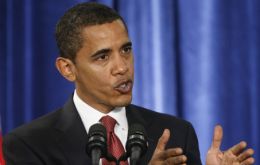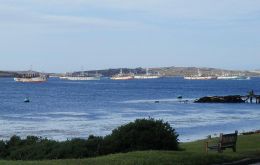MercoPress. South Atlantic News Agency
Economy
-
Tuesday, March 16th 2010 - 18:20 UTC
Petrobras planning to issue 60 billion US dollars of new stock

Brazil’s government managed oil company Petrobras will issue as much as 60 billion US dollars of new stock, most of which will go to the government in exchange for oil rights, Energy Minister Edison Lobao announced Tuesday.
-
Tuesday, March 16th 2010 - 05:13 UTC
EC calls on Britain to further cut the budget deficit: “not ambitious enough”

The European Commission will call on Britain to do more to cut the budget deficit, according to a draft document. The EU executive is also expected to say the UK's medium term plans are not ambitious enough. The report will see the light just weeks before a general election is expected to be announced.
-
Tuesday, March 16th 2010 - 05:10 UTC
Europe agrees to help Greece but loan guarantees have been ruled out

Europe's finance ministers agreed Monday how to help Greece in its battle to control its finances. After a meeting in Brussels, they revealed few details, except that they had ruled out any loan guarantees.
-
Tuesday, March 16th 2010 - 04:58 UTC
Rio Tinto/Alcan presents project for 2.5bn aluminium smelter in Paraguay

Rio Tinto Alcan, a unit of global mining giant Rio Tinto formally presented on Monday plans to invest 2.5 billion US dollars in an aluminium smelter in Paraguay, according to corporation and Asuncion sources.
-
Tuesday, March 16th 2010 - 04:57 UTC
British Airways announces strike contingency plan for 60% of its customers

British Airways says 60% of its customers will be able to keep their travel plans during planned strikes by cabin crew. Industrial action is set to begin with a three-day walkout from Saturday March 20, followed by a four-day stoppage from Saturday March 27.
-
Monday, March 15th 2010 - 19:56 UTC
Unemployment fears threaten UK recovery says Bank of England

Unemployment threatens to hamper the UK economic recovery as worried households cut back on spending, the Bank of England has warned. The latest quarterly bulletin said there was a risk of rising dole queues if “the recovery in demand proves more sluggish than businesses have expected”.
-
Saturday, March 13th 2010 - 02:32 UTC
Lehman Brothers had been using “accounting gimmicks” for years

Former bosses at Lehman Brothers have been accused of using an “accounting gimmick” to hide billions in losses which helped bring about its collapse. The technique, called “Repo 105”, was used to temporarily remove 50 billion US dollars of assets from the US investment bank's balance sheet in 2008, according to a one-year investigation.
-
Saturday, March 13th 2010 - 02:23 UTC
China calls on US not to make the Yuan de facto dollar peg “a political issue”

The United States should not make a political issue out of the Yuan, a Chinese central banker said as the long running friction between the world’s two leading economies approaches a critical deadline.
-
Saturday, March 13th 2010 - 01:02 UTC
Falklands’ economy poised to expand 5.3% following a contraction in 2009

The Falkland Islands economy is expected to expand by 5.3% in real terms during 2010, following a period of contraction in 2009, which was caused primarily by a poor fish harvest rather than the immediate effects of the global recession, according to the Economic Briefing & Forecast released by the Falklands’ government.
-
Saturday, March 13th 2010 - 00:45 UTC
China with 54 billionaires, only second to the US, says Forbes

India and China may still be considered developing countries, but that has not stopped them from producing some of the world's richest people.
